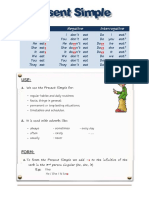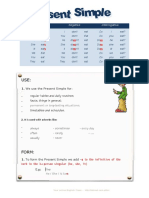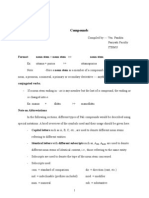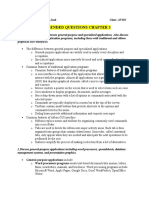Affirmattive Negattive Intterrogattive: S Es Es S Es Es S Es Es
Affirmattive Negattive Intterrogattive: S Es Es S Es Es S Es Es
Uploaded by
Laura GutierrezCopyright:
Available Formats
Affirmattive Negattive Intterrogattive: S Es Es S Es Es S Es Es
Affirmattive Negattive Intterrogattive: S Es Es S Es Es S Es Es
Uploaded by
Laura GutierrezOriginal Description:
Original Title
Copyright
Available Formats
Share this document
Did you find this document useful?
Is this content inappropriate?
Copyright:
Available Formats
Affirmattive Negattive Intterrogattive: S Es Es S Es Es S Es Es
Affirmattive Negattive Intterrogattive: S Es Es S Es Es S Es Es
Uploaded by
Laura GutierrezCopyright:
Available Formats
Affirmattive Negattive Intterrogattive
I eatt I don’tt eatt Do I eatt
?
You eatt You don’tt eatt Do yo eatt
u ?
He eatts He does eatt Does he eatt
n’tt ?
She eatts She does eatt Does sh eatt
n’tt e ?
Itt eatts Itt does eatt Does itt eatt
n’tt ?
We eatt We don’tt eatt Do we eatt
?
USE:You eatt You don’tt eatt Do yo eatt
u ?
1. We use the
They Present Simple
eatt They for:
don’tt eatt Do tth eatt
ey ?
-
-
-
-
2. It is used with Adverbs like:
-
-
-
FORM:
1. To form the Present Simple we ADD –s to the infinitive
of the verb in the 3rd person singulAR (he, she, it)
Your nline English ClASs – http://lAbmAt.com.pt/bri
2. But when the verb ends in:
a) –o, -ss, -sh, -ch, we Add –es
→
→
→
→
b) A consoNAnt followed by –y, the –y chANGes into –ie AND we
ADD -s
c) A vowel followed by –y we just Add -s
3. To form the NEGAtive AND the interrogAtive we need the AUxilIAry
verb to do in the present simple. This MEAns we hAVe to Add –es
in the 3rd person singulAR (he, she, it) while the MAin verb will
be used in the infinitive.
A. Complete the sentences, choosing the correct form of the
verb in brackets.
1. David plays table-tennis. (play/plays)
2. They go to school on foot. (go/goes)
3. Carol lives in Bath. (live/lives)
4. School finishes at 6.30. (finish/finishes)
5. We watch T.V. in the evening. (watch/watches)
6. Jessica studies in her bedroom. (study/studies)
7. The dog sleeps in the kennel. (sleep/sleeps)
8. The children cross the street to school. (cross/crosses)
9. Mr Wilson works in a bank. (work/works)
10. Joe does his homework in the afternoon. (do/does)
B. Rewrite the sentences beginning with he or she.
1. They collect stamps. She collects stamps
2. I go to school by bus. He goes to school by bus _
3. We drive to work. he drives to work.
4. They hurry home every day. she hurries home every day
5. You arrive late every morning. He arrives late every morning
6. They wash their hands before meals. she washes their hands before meals
7. We play basketball twice a week. he plays basketball twice a week.
8. They tidy their bedroom every day. she tidies their bedroom every day.
9. I usually get up at 7.30. he usually gets up at 7.30
10. We listen to the radio at night. she listens to the radio at night.
Fill in with do or Pay attention to the
C. does. aUXiliary verb to
do!
1. does Ronald play basketball?
2. do they work in an office?
3. do you like English?
4. Does Susan usually go to a disco at the weekend?
5. do we walk to school?
6. do Bob and Patrick collect stamps?
7. does the cat sit by the fireplace?
8. does Grace finish school at 6.30?
9. does Mr. Walker read the newspaper in the evening?
10. do you have lunch in the canteen?
D. Complete the sentences with do / don’t / does / doesn’t.
1. do you like Maths? Yes, I do .
2. does Sally like reading? Yes, she does .
3. does Mathew play handball every Saturday? No, he doesn´t .
4. do Jane and Mary go to the cinema on Sunday? No, they don´t .
5. do you like writing letters? No, I don´t .
6. Does Angela get up late? No, she doesn´t .
7. do we spend the afternoon together? Yes, we do .
8. Does Paul like skate-boarding? No, he doesn´t .
9. does the cat like lying in the sun? Yes, it does .
10. do they speak German? No, they don´t .
Rewrite the sentences in
E. the: a) negative form
b) interrogative form
1. I get up at 8.00
everyday. a) I don´t get .
up at 8.00 everyday. ?
b) Do you get up everyday?
2. Grace has breakfast in the kitchen.
a) Grace does not has breakfast in the kitchen.
_.
b) Does grace has breakfast in the kitchen.? ?
3)Mr. Robson drives to work every morning.
a )Mr. Robson does not drive work every morning.
.
b)Does Mr. Robson drive to work every morning?
?
4)We usually do our homework after school.
We usually do not do our homework after school.
a) .
Do We usually do our homework after school?
b) ?
5)Mrs. Davies works in an office.
a. Mrs. Davies does not work in an office.
b Does Mrs. Davies work in an office.?
6 Paul and Mark come back home together.
a Paul and Mark do not come back home together. .
b Do Paul and Mark come back home together. ?
7You go for a walk at night.
a . You don´t go for a walk at night.
b Do You go for a walk at night. ?
You might also like
- Js-A.m.a601 (Es6 01)Document6 pagesJs-A.m.a601 (Es6 01)Nguyễn Công Tuấn Anh0% (1)
- RSA Public-Key Encryption and Signature LabDocument6 pagesRSA Public-Key Encryption and Signature Labnatnael alemayehuNo ratings yet
- Present Simple ExercisesDocument5 pagesPresent Simple ExercisesWìlinton CastañedaNo ratings yet
- Present Simple Worksheet454Document5 pagesPresent Simple Worksheet454Andres ScamanderNo ratings yet
- Affirmattive Negattive Intterrogattive: S Es Es S Es Es S Es EsDocument5 pagesAffirmattive Negattive Intterrogattive: S Es Es S Es Es S Es EscarlosNo ratings yet
- JHON MONSALVE - Simple PresentDocument6 pagesJHON MONSALVE - Simple PresentCARLITOS FTNo ratings yet
- Present Simple Exercises YaDocument5 pagesPresent Simple Exercises YaWìlinton CastañedaNo ratings yet
- Affirmattive Negattive Intterrogattive: S Es Es S Es Es S Es EsDocument5 pagesAffirmattive Negattive Intterrogattive: S Es Es S Es Es S Es EsAdriana Reyes100% (1)
- Kelly Fiorella Giron AlamoDocument6 pagesKelly Fiorella Giron AlamoJose Armando Aguilar RamirezNo ratings yet
- Taller Present Simple InglesDocument5 pagesTaller Present Simple InglesStefanny BalagueraNo ratings yet
- Affirmative Negative Interrogative: S Es Es S Es Es S Es EsDocument9 pagesAffirmative Negative Interrogative: S Es Es S Es Es S Es EsSebastian RojasNo ratings yet
- Taller de Nivelacion para NovenoDocument5 pagesTaller de Nivelacion para NovenokatheNo ratings yet
- Cuadernillo 2nd Grade EnglishDocument8 pagesCuadernillo 2nd Grade Englishfernando motaNo ratings yet
- Affirmattive Negattive Intterrogattive: S Es Es S Es Es S Es EsDocument6 pagesAffirmattive Negattive Intterrogattive: S Es Es S Es Es S Es EsLaura GutierrezNo ratings yet
- Affirmattive Negattive Intterrogattive: S Es Es S Es Es S Es EsDocument5 pagesAffirmattive Negattive Intterrogattive: S Es Es S Es Es S Es EsGuilherme AugustoNo ratings yet
- Present Simple - Extra ActivityDocument5 pagesPresent Simple - Extra ActivityJairo TurriateNo ratings yet
- Affirmative Negative Interrogative: S e S Es S e S Es S e S EsDocument5 pagesAffirmative Negative Interrogative: S e S Es S e S Es S e S EsCarlos VazquezNo ratings yet
- Affirmattive Negattive Intterrogattive: S Es Es S Es Es S Es EsDocument4 pagesAffirmattive Negattive Intterrogattive: S Es Es S Es Es S Es EsYURY HASBLEIDY GIRON CABEZASNo ratings yet
- Present-Simple ENFERMERÍA 3 SEMESTREDocument6 pagesPresent-Simple ENFERMERÍA 3 SEMESTREesdras.gadmiel.mejia.cbtis243No ratings yet
- Homework 1Document5 pagesHomework 1dianisssssbio70% (10)
- Guia Inglés Semana 1 - Tercero MedioDocument6 pagesGuia Inglés Semana 1 - Tercero MedioAndrea Villegas FigueroaNo ratings yet
- 4 Present SimpleDocument3 pages4 Present Simplecolmenaresangie0No ratings yet
- Simple Present Tense - Part 4Document8 pagesSimple Present Tense - Part 4Ghita H.No ratings yet
- Simple Present: I Get Up EarlyDocument24 pagesSimple Present: I Get Up EarlyMarleny Ketty Esteban MatamorosNo ratings yet
- Present Simple (1) : AfirmativaDocument5 pagesPresent Simple (1) : AfirmativaRoger pájaroNo ratings yet
- Present SimpleDocument1 pagePresent SimpleTrang HoàngNo ratings yet
- Present Simple Exercices 1Document1 pagePresent Simple Exercices 1api-237751184No ratings yet
- Present-Simple WorksheetDocument5 pagesPresent-Simple WorksheetNilgün Aksakaloğlu BalcıNo ratings yet
- Presentsimple ActivityDocument5 pagesPresentsimple ActivityLia PertuzNo ratings yet
- Present Simple WorkshopDocument6 pagesPresent Simple WorkshopJuan David LondoñoNo ratings yet
- Daily RoutineDocument5 pagesDaily Routinemiaudina simanjuntakNo ratings yet
- To Drive To My English Class (I) - I Drive To My English Class/ I Don T Drive To My English Class/ DO I DRIVE To My English Class?Document4 pagesTo Drive To My English Class (I) - I Drive To My English Class/ I Don T Drive To My English Class/ DO I DRIVE To My English Class?Andrea CarvalhoNo ratings yet
- HandoutDocument83 pagesHandoutsalivopNo ratings yet
- Eng Ii - Unit 2Document32 pagesEng Ii - Unit 2WhatsApp ICPNANo ratings yet
- AH1 Pre-Exam PreparationDocument6 pagesAH1 Pre-Exam PreparationERICKA ORALIA PATZAN YOCNo ratings yet
- Grade 7 English LanguageDocument83 pagesGrade 7 English LanguageninigraceNo ratings yet
- Clase IV - Presente Simple, Verbo DoDocument27 pagesClase IV - Presente Simple, Verbo DoDenis CalleNo ratings yet
- Simple Present TenseDocument13 pagesSimple Present TenseJOSE PORFIRIO ZAMBRANO SANDOVALNo ratings yet
- Universidad Técnica Estatal de QuevedoDocument45 pagesUniversidad Técnica Estatal de QuevedoDIEGO ALEXIS PILAGUANO AYALANo ratings yet
- EXAMEN Present Simple Past Simple Past ContinuousDocument6 pagesEXAMEN Present Simple Past Simple Past ContinuousAngélica CetinaNo ratings yet
- Simple Present Tense: Subj + Aux + Not + V+ C Idonothaveacar. She Doesn't Clean My CarDocument2 pagesSimple Present Tense: Subj + Aux + Not + V+ C Idonothaveacar. She Doesn't Clean My CarLaura GutierrezNo ratings yet
- Rubiel Meneses Gaviria - Tarea Presente SimpleDocument4 pagesRubiel Meneses Gaviria - Tarea Presente SimpleNoticias Virales ExtremasNo ratings yet
- WORKSHEETS 6°present SimpleDocument3 pagesWORKSHEETS 6°present SimpleINGRID LAITONNo ratings yet
- Worksheet 2. Present Simple Tense. MarilynDocument2 pagesWorksheet 2. Present Simple Tense. Marilynmarilyn jimenez ortizNo ratings yet
- 40/ Tedd A Megfelelő Sorrendbe A Szavakat/kifejezéseket!Document3 pages40/ Tedd A Megfelelő Sorrendbe A Szavakat/kifejezéseket!Adrienn Fenyvesi - GyörgyiNo ratings yet
- Session 6 - Level 5Document11 pagesSession 6 - Level 5NAYELY BELLODASNo ratings yet
- Solución Guia 1 Ingles Maria FlorezDocument3 pagesSolución Guia 1 Ingles Maria FlorezJhon RodriguezNo ratings yet
- English 1-Clase 3Document4 pagesEnglish 1-Clase 3Liz Estefany Pacompia ChambillaNo ratings yet
- Clase y Practica Present SimpleDocument6 pagesClase y Practica Present SimpleKaren MestanzaNo ratings yet
- Plan de Mejoramiento de InglesDocument5 pagesPlan de Mejoramiento de InglesNando RuizNo ratings yet
- Simple PresentDocument2 pagesSimple Presentjuan lopez100% (2)
- Affirmative Negative Interrogative: S S S Es Es Es Es Es EsDocument6 pagesAffirmative Negative Interrogative: S S S Es Es Es Es Es EsJunior MonteroNo ratings yet
- Ingles Cuadernillo 4to Año 2024Document34 pagesIngles Cuadernillo 4to Año 2024Veronica gabriela FernándezNo ratings yet
- Soal Exercise Bahasa Inggris Simple Present Tensesmp Kelas 8Document2 pagesSoal Exercise Bahasa Inggris Simple Present Tensesmp Kelas 8hendsukmatrismNo ratings yet
- Present Simple TenseDocument3 pagesPresent Simple Tensefm5zntckdpNo ratings yet
- Simple PresentDocument2 pagesSimple Presentsindy GonzalezNo ratings yet
- Affirmative Negative Interrogative: S S S Es Es Es Es Es EsDocument5 pagesAffirmative Negative Interrogative: S S S Es Es Es Es Es EsBARRERO RUBIO JUAN CAMILONo ratings yet
- Affirmative Negative Interrogative: S S S Es Es Es Es Es EsDocument5 pagesAffirmative Negative Interrogative: S S S Es Es Es Es Es EsmartimdinisNo ratings yet
- Simple Present Exercises PDF 9-cDocument4 pagesSimple Present Exercises PDF 9-cKelly PabonNo ratings yet
- English Verb Tenses: Practice and Speak Like a NativeFrom EverandEnglish Verb Tenses: Practice and Speak Like a NativeRating: 5 out of 5 stars5/5 (1)
- Banker's Wife's Blues: Does Live LivesDocument30 pagesBanker's Wife's Blues: Does Live LivesLaura GutierrezNo ratings yet
- Present Simple Power PointDocument12 pagesPresent Simple Power PointLaura GutierrezNo ratings yet
- Simple Present - Test 1: A - Put in The Correct Verb FormsDocument3 pagesSimple Present - Test 1: A - Put in The Correct Verb FormsLaura GutierrezNo ratings yet
- Simple Present Tense: Subj + Aux + Not + V+ C Idonothaveacar. She Doesn't Clean My CarDocument2 pagesSimple Present Tense: Subj + Aux + Not + V+ C Idonothaveacar. She Doesn't Clean My CarLaura GutierrezNo ratings yet
- Form Present SimpleDocument4 pagesForm Present SimpleLaura GutierrezNo ratings yet
- Affirmattive Negattive Intterrogattive: S Es Es S Es Es S Es EsDocument6 pagesAffirmattive Negattive Intterrogattive: S Es Es S Es Es S Es EsLaura GutierrezNo ratings yet
- UHL2422 Assessment 4 Sem 2 2015 2016 Recommendation Report FINAL2 DRAFTDocument11 pagesUHL2422 Assessment 4 Sem 2 2015 2016 Recommendation Report FINAL2 DRAFTRima ChinnasamyNo ratings yet
- Cultural Differences in Teaching and Learning StylesDocument18 pagesCultural Differences in Teaching and Learning StylesngohathaonhiNo ratings yet
- UntitledDocument131 pagesUntitledJunyah BoyceNo ratings yet
- Name Grade Level Learning Area/Quarter Date: Vi-Aquamarine Music/Fourth QuarterDocument5 pagesName Grade Level Learning Area/Quarter Date: Vi-Aquamarine Music/Fourth QuarterChel CalejaNo ratings yet
- SeismiGraphix User Guide V140Document33 pagesSeismiGraphix User Guide V140Marcio CorreaNo ratings yet
- Self-Learning Module For Grade 11: Chapter Ii: Normal DistributionDocument38 pagesSelf-Learning Module For Grade 11: Chapter Ii: Normal DistributionAldrin Dela CruzNo ratings yet
- Conduction Power Loss in MOSFET Synchronous Rectifier With Parallel-Connected Schottky Barrier DiodeDocument7 pagesConduction Power Loss in MOSFET Synchronous Rectifier With Parallel-Connected Schottky Barrier DiodeMuhammad Saqib AliNo ratings yet
- The Importance of Using Games in EFL Classrooms PDFDocument10 pagesThe Importance of Using Games in EFL Classrooms PDFzequiel fernandesNo ratings yet
- 3.2 Calculating Limits of Transcendental Functions and Indeterminate FormsDocument13 pages3.2 Calculating Limits of Transcendental Functions and Indeterminate Formscharlene quiambaoNo ratings yet
- Internet Banking Java Project ReportDocument68 pagesInternet Banking Java Project ReportKUMAR NILESH100% (1)
- Article - Good and Bad ArgumentsDocument6 pagesArticle - Good and Bad Argumentsdeepansh sharmaNo ratings yet
- The AnchorDocument37 pagesThe AnchorpacurarNo ratings yet
- Isaac The Syrians Spiritual Works (Mary T. Hansbury (Ed.) ) (Z-Library)Document403 pagesIsaac The Syrians Spiritual Works (Mary T. Hansbury (Ed.) ) (Z-Library)Caio CardosoNo ratings yet
- MAC500 (MicroSmart) Service ManualDocument94 pagesMAC500 (MicroSmart) Service ManualignashewNo ratings yet
- A Review of The Secret Lives of Baba Segi's WivesDocument1 pageA Review of The Secret Lives of Baba Segi's WivesNicholas BenitaNo ratings yet
- Iv Ba DTPDocument57 pagesIv Ba DTPtaiba shamsNo ratings yet
- Operating Manual: HGM6200K Series Automatic Generator ModuleDocument35 pagesOperating Manual: HGM6200K Series Automatic Generator Modulejorgehrdz269No ratings yet
- Pali Compounds - Ven. PanditaDocument6 pagesPali Compounds - Ven. PanditakithaironNo ratings yet
- Data StructuresDocument5 pagesData StructurespathmakerpkNo ratings yet
- SASTRA Deemed To Be UniversityDocument1 pageSASTRA Deemed To Be UniversityGayathri BNo ratings yet
- Production Guidelines MarulaDocument20 pagesProduction Guidelines MarulaStew TaylorNo ratings yet
- Holybiblecontain00unse 38Document1,848 pagesHolybiblecontain00unse 38Branko NikolicNo ratings yet
- Discrete MathematicsQBDocument7 pagesDiscrete MathematicsQBYashvardhan100% (1)
- English Chapter 4 Jungle Jamboree, Picture Story Writing, Paragraph Writing, Simple Past CB - WBDocument36 pagesEnglish Chapter 4 Jungle Jamboree, Picture Story Writing, Paragraph Writing, Simple Past CB - WBanvi daniNo ratings yet
- Frost - "The Tuft of FLowers"Document4 pagesFrost - "The Tuft of FLowers"Alicia Y. WeiNo ratings yet
- Smartone Dispatch: User GuideDocument125 pagesSmartone Dispatch: User GuideProceso SIG - OAGRD CAUCANo ratings yet
- Checklist For SpeakingDocument1 pageChecklist For SpeakingvijayanNo ratings yet
- Open-Ended Questions Chapter 3Document3 pagesOpen-Ended Questions Chapter 3Nguyễn Khánh LinhNo ratings yet





























































































